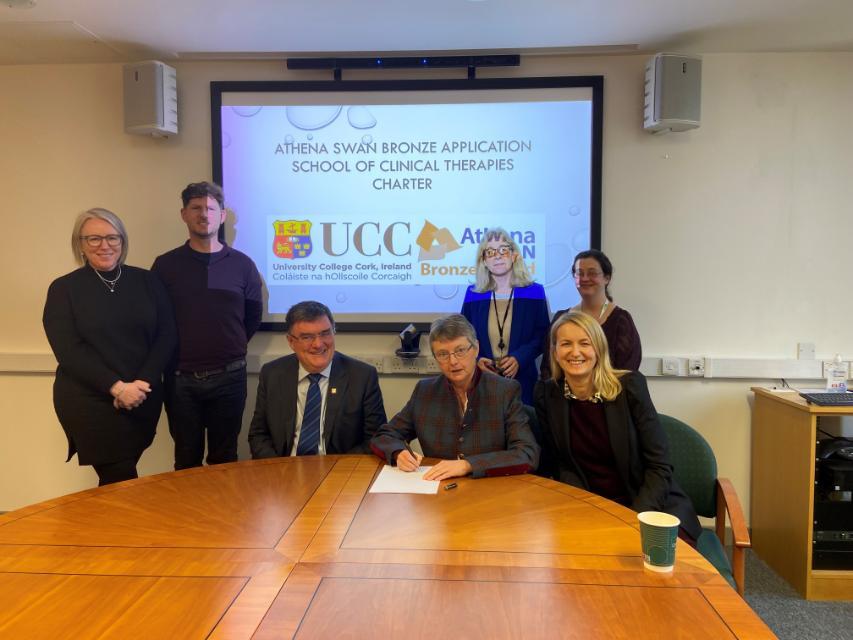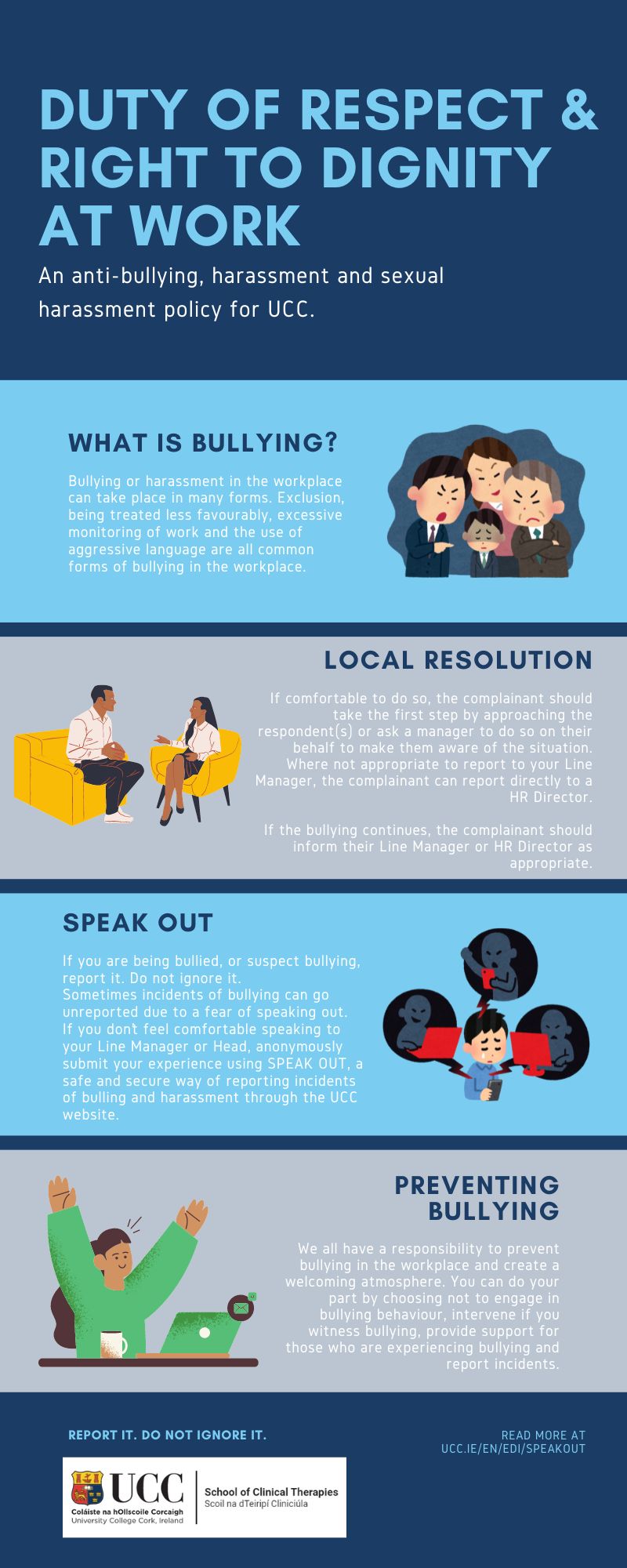On the 18th of October 2024, the Clinical Therapies society ran a bake sale for Developmental Language Disorder (DLD) Awareness Day.
Read moreUpdates
The School of Clinical Therapies Equality Diversity and Inclusion Committee held their first ever event on Thursday the 7th of September. We were delighted to be joined by Mary O Rourke and Diarmuid (Co-Chairs of the UCC LGBT+ Staff Network), plus Julie Butters who is also on the committee of the UCC LGBT+ Staff Network to hear about LGBT+ history and the work of the committee. We were also joined by Maggie O’Sullivan from the Graduates Attributes Programme who introduced the ‘Proud Ally’ initiative for UCC students that they have recently developed and launched.
After the event we celebrated all of the career promotions across the School over the last year over some cake.
Speak Out
Anonymously report an incident using Speak Out by selecting "Make a Report", below.
Head of School, Prof Nicole Müller and members of the School's Athena Swan Self-Assessment Team signing the Athena Swan Charter with Dr Frank Burke, Chair of the College of Medicine and Health Athena Swan Steering Committee
Athena Swan
The School of Clinical Therapies is proud to annonce that we have committed to the Athena Swan Charter Principles and applied for our first Bronze Award. The aim of this award is to address unequal gender representation across the school and promote an environment of equal opportunities for all.
Outlined below are the Athena Swan Charter Principles
UPDATE
The School of Clinical Therapies is delighted to confirm that we have been awarded the Athena Swan Bronze Award. Click here to view our School of Clinical Therapies Athena Swan Bronze Application.
https://www.ucc.ie/en/news/2023/ucc-achieves-athena-swan-bronze-awards.html.
Athena Swan Ireland Principles
- Adopting robust, transparent, and accountable processes for Athena Swan work, including:
- Embedding equality, diversity, and inclusion in our culture, decision-making and partnerships, and holding ourselves and others in our institution/department/professional unit accountable.
- Ensuring active leadership from senior staff, with those in senior roles at the forefront of taking action, and inspiring and fostering dedication and involvement from staff at all levels.
- Collecting equality monitoring data to measure, understand and publicly report on challenges and progress, taking steps when necessary to support and encourage disclosure.
- Undertaking transparent self-assessment processes to ensure priorities, interventions and actions are evidenced-based and inform our continuous development.
- Distributing tasks appropriately, formally recognising and rewarding work and ensuring there is not a disproportionate burden on underrepresented groups.
- Making and mainstreaming sustainable structural and cultural changes to remedy the effects of structural inequalities and social injustices, which manifest as differential experiences and outcomes for staff and students.
- Tackling behaviours and cultures that detract from the creation of an institutional campus culture that is safe, respectful and supportive, including condemning sexual violence and harassment, bullying, discrimination, unfair treatment, or exploitation of staff, students or partners.
- Addressing unequal gender representation across academic disciplines and professional, managerial and support functions, including examining gendered occupational segregation, and elevating the status, voice, and career opportunities of under-valued and at-risk groups.
- Fostering collective understanding that intersectional inequalities must be accounted for in the
development of effective equality analysis and actions. - Mitigating the equality impacts of short-term and casual contracts for staff seeking sustainable
careers. - Supporting flexibility and the maintenance of a healthy ‘whole life balance’ and mitigating the
equality impact of career breaks and caring responsibilities. - Fostering collective understanding that individuals have the right to determine and affirm their gender, and to implementing inclusive and effective policies and practices that are cognisant of the lived experiences and needs of trans and non-binary people.
Priority Actions
The School undertook a self-assessment process in 2021/22 and from that identified a number of actions that we hope to address between 2022-2026. Our priority action areas are as follows
PRIORITY ACTION 1: TO IMPROVE THE CAREER STRUCTURE & PROMOTION PATHWAYS FOR PRACTICE EDUCATION STAFF
PRIORITY ACTION 2: TO IMPROVE THE GENDER DIVERSITY OF THE SCHOOL BY INCREASING THE NUMBER OF MALE STUDENTS
PRIORITY ACTION 3: TO SUPPORT ACADEMICS FROM CLINICAL BACKGROUNDS TO ACHIEVE CAREER PROGRESSION AND PROMOTION TO THE SENIOR LECTURER LEVEL
PRIORITY ACTION 4: TO IMPROVE CULTURE & STAFF WELLBEING BY TARGETING WORK LIFE BALANCE; WORKLOAD; INCLUSION & CONNECTION; SUPPORT FORFAMILY LEAVE & COMMUNICATING CLEAR VALUES AND EXPECTATIONS ABOUTHOW PEOPLE SHOULD BEHAVE
PRIORITY ACTION 5: TO ESTABLISH A SCHOOL EQUALITY DIVERSITY & INCLUSION COMMITTEE TO MOVE THE ATHENA SWAN/ EDI AGENDA FORWARD
University Initiatives to target Equality Diversity and Inclusion
Duty of Respect & Right to Dignity at Work
The School of Clinical Therapies EDI Committee is excited to share the below infographic that was developed internally and will be displayed across the University.
.png)
Anti-bullying Infographic
The EDI committee have created an infographic poster to inform you about the UCC Duty of Respect and Right to Dignity at Work policy.
Suggestions
We are committed to Equality, Diversity, and Inclusion, and as such, we are interested in your feedback in how we can improve. Please feel free to leave any comments and suggestions you may have, all comments are anonymous.




.jpg)